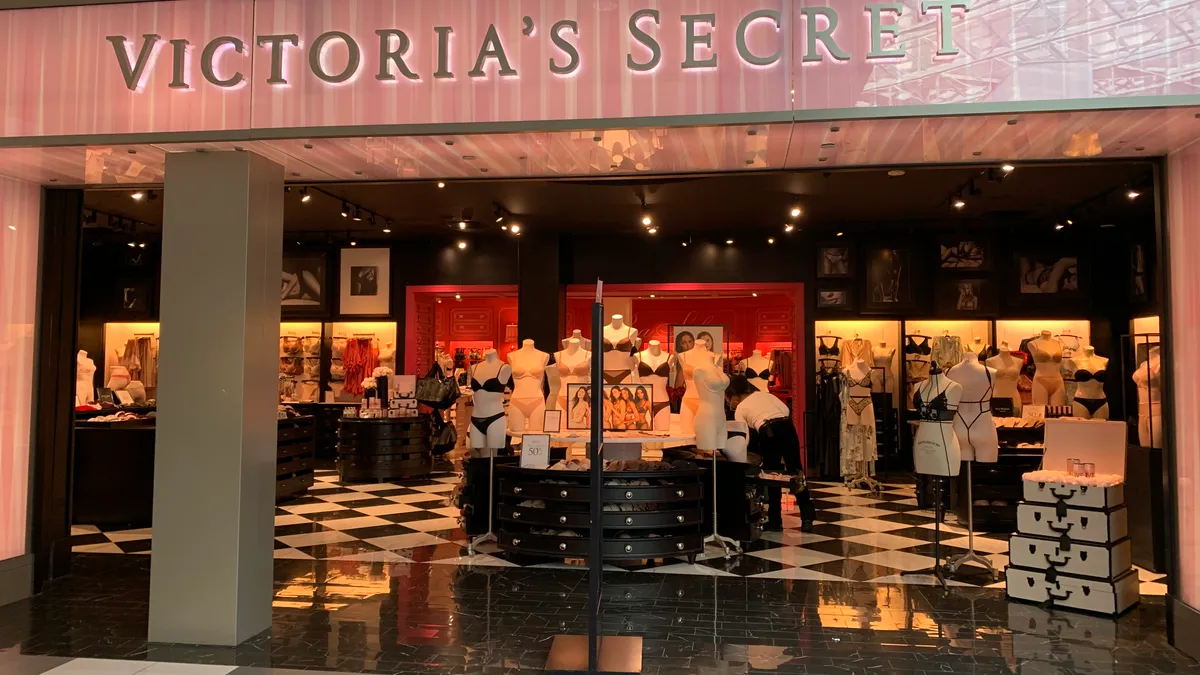Dive Brief:
-
With almost all stores temporarily closed since March 17 due to the COVID-19 pandemic, L Brands said Wednesday that first quarter net sales fell 37% to $1.65 billion from $2.63 billion a year ago. The company will close 250 Victoria's Secret stores it owns in North America "over the next few months," executives said in a call with analysts.
-
Store comps at Victoria's Secret tumbled 13%, but at Bath & Body Works rose 41%, thanks in part to sales of sanitizer and soaps, the company said. Victoria's Secret digital sales fell 15% to $307.6 million, partially driven by a six-day closure of the website. In April, with the site up and stores closed, e-commerce rose 30%. Bath & Body Works e-commerce sales rose 85%.
-
The company swung to an adjusted operating loss of $220.9 million from operating income in the year-ago quarter of $153.3 million, and to adjusted net loss of $275.2 million, from net income of $40.3 million last year.
Dive Insight:
L Brands founder Leslie Wexner officially stepped down as chief executive a week ago, leaving the company at a precarious moment made more dire by a pandemic that forced shut nonessential retail stores.
It's the end of an era, but the beginning of a new one, with the company looking to its better-performing personal care business, which has enjoyed a rare uplift during the pandemic thanks to its assortment of soaps and cleansers, for salvation — and scaling back the focus on apparel that guided Wexner's success for six decades.
In fact, while Victoria's Secret remains firmly in L Brands after an agreement to sell a majority stake to private equity firm Sycamore Partners broke down last month, the company outlined its commitment to separating the two businesses. Analysts appear to see that as necessary even as they note a muddy picture, especially for the struggling lingerie brand. Credit Suisse analyst Michael Binetti, for example, called for more clarity, asserting that the company's list of cost management plans for Victoria's Secret (including the significant number of store closures), didn't include "enough evidence today to inform of LB's ability/timing to affect a separation of VS."
The breakdown of the sale to Sycamore closed off one avenue for Victoria's Secret to turn around, according to emailed comments from GlobalData Retail Managing Director Neil Saunders. "Victoria's Secret has been a brand in decline for many years. It went into this crisis in a weakened state and will emerge even more enfeebled," he warned, noting that even before the pandemic, revenues and comps were both down. "While there was some consumer disruption just before the shutdown, in our view, the deterioration shows how quickly consumers drifted away from Victoria's Secret and the weak loyalty and affinity many of them have for the brand. This underscored by the fact that while online did grow during lockdown, the transfer of trade from stores was relatively poor."
Indeed, anticipation of much of a turnaround there appears to have waned. "[T]he COVID-19 forced Vicky to scramble for survival," Wedbush analysts led by Jen Redding said in emailed comments, adding that, on top of its operating woes, Wedbush research shows that "inventory continues to pile up in" the second quarter.
In addition to store closures, the brand is "evaluating strategic alternatives to reduce or eliminate losses in the U.K. and China," per remarks prepared ahead of the call that were emailed to Retail Dive.
There's hope for Victoria's Secret as a smaller operation, however, according to BMO Capital Markets Managing Director Simeon Siegel, who noted April's e-commerce bump and plans to boost profits. "Although one of the largest brands in the history of time, VS essentially loses money and we believe a smaller VS could be a healthier VS," he said in emailed comments.
Bath & Body Works' results, and its trajectory, stand in high contrast to all that, which argues for the separation. Even its candles smell better than rivals, according to Saunders. "This great product quality combined with reasonable prices and a fun approach to retail creates a great value proposition that attracts customers."
And the fact that the customers flocked to the brand via the internet "should go a long way to calming investor fears" about its ability to go it alone, considering its performance with store closed, Binetti said. "[T]he consumer [is] clearly following this brand online."
That came at a cost however, signaling once again how steep the price of selling online can be. The brand's merchandise margin rate for the quarter was down 90 basis points year over year, "primarily driven by a greater mix into the direct channel," the company said. Product margin was up, however, thanks to lower promotions.
















